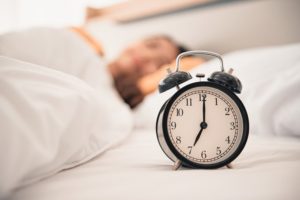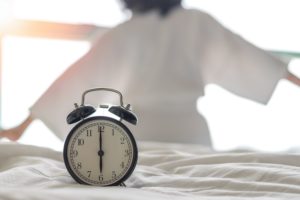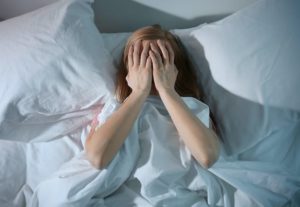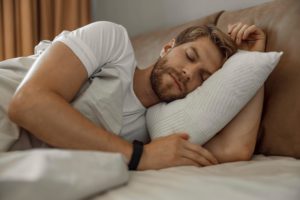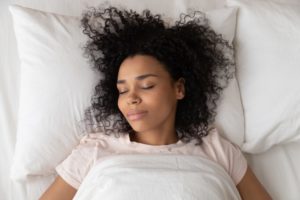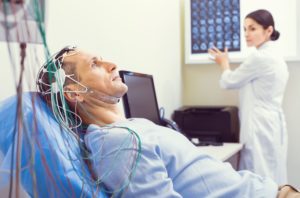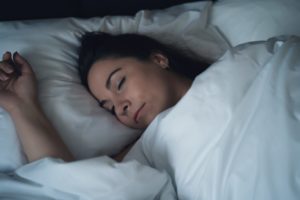When you buy through our links, we may earn a commission. Products or services may be offered by an affiliated entity. Learn more.
Adenosine and Sleep: Understanding Your Sleep Drive
- Adenosine is a neurotransmitter that promotes sleep drive, or a person’s need to sleep.
- Deep sleep or slow-wave sleep is believed to be prolonged by adenosine.
- Adenosine is not in any sleep aids due to the blood-brain barrier and unwanted side-effects.
You know how the longer you go without sleep, the stronger your desire to go to sleep gets? That intensifying urge to sleep is called sleep drive, and it is fueled by a chemical called adenosine.
We explore how adenosine works, its interactions with caffeine, and why it’s not used as a sleep aid or supplement.
What Is Adenosine?
Adenosine is a neurotransmitter found in the human body that promotes the sleep drive, or a person’s need to sleep. Adenosine also plays a role in other body functions, including the immune, circulatory, respiratory, and urinary systems.
When taken as a medication, adenosine can reduce heart rate and help manage irregular heartbeats. The administration of adenosine can also reduce pain and lower blood pressure for those undergoing surgery.
Looking to improve your sleep? Try upgrading your mattress.
How Adenosine Fuels Your Sleep Drive
Adenosine is involved in storing and releasing energy throughout the body. In particular, the compound adenosine triphosphate (ATP) works as “energy currency” – when your body needs energy to contract a muscle or transmit a brain signal, it frees energy by breaking down ATP and releasing adenosine as a byproduct.
Adenosine’s relationship to sleep is connected to its use in the brain, which consumes more ATP than any other part of the body. As activity in your brain breaks down ATP, adenosine builds up in the space between cells. Scientists hypothesize that when you stay awake for too long, the accumulating adenosine begins to limit activity in areas of your brain associated with wakefulness, allowing your sleep drive to kick in.
Once you fall asleep, adenosine is believed to prolong deep sleep or slow-wave sleep. This stage of sleep plays a restorative role and allows your body to recover from sleep deprivation. While you sleep, the brain converts adenosine back into ATP, essentially eliminating your sleep drive.
The Battle Between Adenosine and Caffeine
Caffeine is a central nervous system stimulant known to counteract sleepiness and help people feel more awake. This naturally occurring substance is found in many beverages and some foods, including coffee, tea, energy drinks, and chocolate.
The primary way that caffeine works is by blocking adenosine receptors in the brain. Deterred from detecting adenosine, the brain continues releasing chemicals that promote wakefulness. Caffeine’s ability to block adenosine receptors may also contribute to its effects on the cardiovascular system, causing blood vessels to constrict and blood pressure to rise.
However, if you regularly consume caffeine, you may build up a tolerance to it, and you may not feel its effects as strongly.
Do Adenosine Supplements Exist?
Adenosine is not an ingredient in any medications or supplements intended to help people sleep. While adenosine is present in drugs used to diagnose and treat heart conditions, its potential use as a sleep aid faces two significant challenges:
- The blood-brain barrier:This network of cells that surrounds and protects the brain makes it hard for drug forms of adenosine to pass from the blood into the brain, where it is needed to induce sleepiness.
- Unwanted side-effects:Adenosine is a vasodilator, which means that it causes blood vessels to relax. Even if a method for breaching the blood-brain barrier were developed, taking supplemental forms of adenosine would likely cause unwanted side-effects, such as low blood pressure.
Frequently Asked Questions About Adenosine and Sleep
Does Melatonin Promote Adenosine?
Experiments conducted on fish suggest that melatonin activates adenosine signaling, thereby increasing sleep drive. More research is needed to determine whether melatonin promotes adenosine in humans.
Does Adenosine Affect Circadian Rhythms?
Recent research indicates that adenosine can influence circadian rhythms, which govern the sleep-wake cycle. Typically, light and darkness serve as important cues that help set a person’s internal clock, but a build-up of adenosine appears to make it less likely that a person will feel awake when they’re exposed to light.
What Is the Relationship Between Adenosine and RLS?
There appears to be a link between adenosine and restless legs syndrome (RLS), a sleep disorder that causes an intense urge to move one’s legs at night. People with RLS often don’t have enough iron in their brains, and scientists have found that this can lead to low levels of adenosine. Drugs that facilitate a buildup of adenosine have been shown to improve sleep and reduce limb movements in people with RLS.

Still have questions? Ask our community!
Join our Sleep Care Community — a trusted hub of product specialists, sleep health professionals, and people just like you. Whether you’re searching for the perfect mattress or need expert sleep advice, we’ve got you covered. Get personalized guidance from the experts who know sleep best.
References
6 Sources
-
Liu, Y. J., Chen, J., Li, X., Zhou, X., Hu, Y. M., Chu, S. F., Peng, Y., & Chen, N. H. (2019). Research progress on adenosine in central nervous system diseases. CNS neuroscience & therapeutics, 25(9), 899–910.
https://pubmed.ncbi.nlm.nih.gov/31334608 -
Kirsh, D. (2023 November). Stages and architecture of normal sleep. In A. Eichler. UpToDate., Retrieved November 28, 2023, from
https://www.uptodate.com/contents/stages-and-architecture-of-normal-sleep -
Dunn J/ & Grider M.H. (2023 February). Physiology, Adenosine Triphosphate. StatPearls.
https://www.ncbi.nlm.nih.gov/books/NBK553175/ -
Reichert, C. F., Deboer, T., & Landolt, H. P. (2022). Adenosine, caffeine, and sleep-wake regulation: state of the science and perspectives. Journal of sleep research, 31(4), e13597.
https://pubmed.ncbi.nlm.nih.gov/35575450/ -
Bordeaux, B. & Lieberman, H. (2023 November). Benefits and risks of caffeine and caffeinated beverages. In D. Seres & S. Swenson (Ed.). UpToDate., Retrieved December 1, 2023, from
https://www.uptodate.com/contents/benefits-and-risks-of-caffeine-and-caffeinated-beverages -
Giardina, E. (2023 November). Cardiovascular effects of caffeine and caffeinated beverages. In B. Gersh & S. Swenson (Ed.). UpToDate., Retrieved December 1, 2023, from
https://www.uptodate.com/contents/cardiovascular-effects-of-caffeine-and-caffeinated-beverages



